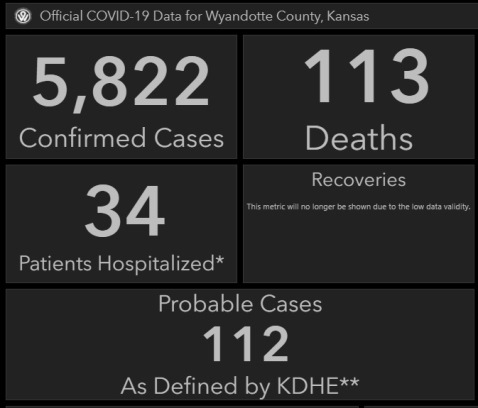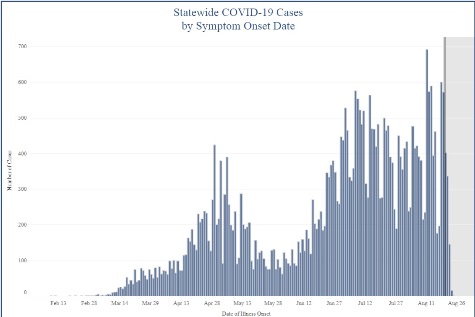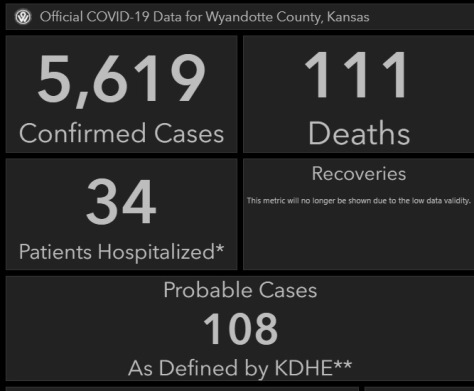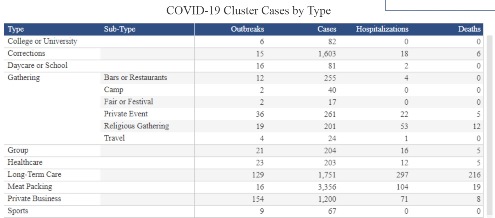
Hundreds of COVID-19 cases are cropping up in colleges and universities in Kansas, according to Dr. Lee Norman, Kansas secretary of health.
Dr. Norman made his remarks at the Aug. 28 University of Kansas Health System news conference.
At this time, kindergarten through 12th grade schools tend to be doing better than colleges, he added.
Some universities, such as KU, are doing widespread testing. At KU, 10 fraternities and sororities recently were quarantined because of COVID-19 cases, according to the doctors.
The KDHE website stated there were 16 outbreaks in colleges and universities, with 189 cases and one hospitalization.
Dr. Norman said they would start displaying data for schools and universities soon on the KDHE COVID-19 website.
He said the school and colleges would be listed by name so people have access. They will associate the fraternity and sorority houses with the university, he added.
Dr. Steve Stites said congregations, parties, fraternities, games, political rallies – it doesn’t really matter what the event is, if people don’t wear masks and socially distance.
Spreadsheets show school COVID-19 numbers
Alisha Morris, an Olathe theater teacher, has created spreadsheets that tell how much COVID-19 is in schools throughout the nation.
Her spreadsheets have become very popular, especially among teachers who are looking for more information about COVID-19 in schools. At the KU Health Systems news conference, she said she enters information from published news reports on the spreadsheets, and she has other volunteers who help.
Because there are so many hours required to collect and enter this data, Morris said she will soon be turning over the spreadsheets to the National Education Association to work on it, while she goes to teacher training to get ready for school starting.
Morris said some school district leaders have told her they used the information from the spreadsheets in order to help make decisions.
Also, the amount of COVID-19 in a school building is the kind of information a lot of parents would want to know when making the decision about whether to send their children back to school, according to Morris.
Morris’ spreadsheet for Kansas schools shows five school districts, none in Wyandotte County. The list includes the Blue Valley School District in Johnson County.
She said although school has not yet started in many areas of Kansas, some of the COVID-19 cases are from athletic practices that have started.
Dr. Steve Stites, chief medical officer at KU Health System, said the decision many parents are making on whether to go back to school in person is a private and personal one based on health and family, among other factors. One of the other factors is knowing the risk in the school and community, and the data provided by the spreadsheet may help parents with that.
The University of Kansas Health System reported 27 positive acute COVID-19 cases on Friday morning, down two from Thursday morning, according to Dr. Dana Hawkinson, medical director of infection control and prevention. There were four patients in the intensive care unit, down from 10 on Thursday, and three on ventilators, down from five on Thursday.
There were another 27 patients hospitalized at KU Health System with COVID-19 who are not in the acute infection phase any longer, with three of those on ventilators, according to Dr. Hawkinson.
Wyandotte County had 44 new positive COVID-19 cases on Friday, with a cumulative total of 5,822, according to the UG COVID-19 website. There were no additional deaths on Friday, with a cumulative total of 113.
The state of Kansas reported 41,048 COVID-19 cases with 443 deaths on Friday morning, according to the KDHE. It was an increase of 1,111 cases since Wednesday, and six more deaths since Wednesday, according to KDHE.
The KC Region COVID-19 Resource Hub reported a total cumulative 31,984 cases on Friday in a nine-county area. Kansas City, Missouri, reported 8,466 cases, according to the website.
There were 501 outbreaks in the state reported on Friday, an increase of 26 outbreaks since Wednesday, according to the KDHE.
Johnson County reported 7,920 cases on Friday, an increase of 238 cases since Wednesday, according to the KDHE.
Leavenworth County reported 1,674 cases on Friday, an increase of 16 cases since Wednesday, KDHE stated.
Sedgwick County, which includes Wichita, reported 7,093 cases, an increase of 101 cases since Wednesday, according to KDHE.
Douglas County, which includes Lawrence, reported 1,189 cases, an increase of 114 cases since Wednesday, according to KDHE. All the university students are being tested in Douglas County, and they are counted in that county’s total.
Riley County, where Manhattan is located, reported 656 cases on Friday, an increase of 82 cases since Wednesday, according to KDHE.
Shawnee County, which includes Topeka, reported 2,123 cases, an increase of 56 cases since Wednesday, according to KDHE.
Quarantines could be ahead for those who attend away football games
Quarantines for attending a University of Kansas or Kansas State University away football game?
That might be possible now that the Kansas Department of Health and Environment has issued new travel guidelines.
One of the new KDHE travel guidelines says that anyone who attends an out-of-state gathering of more than 500 people after Aug. 11 should quarantine for 14 days.
Dr. Lee Norman, Kansas secretary of health, said on Friday morning that cases are cropping up from gatherings without social distancing and mask-wearing.
“If they can’t be social distanced, then they should be quarantined upon coming back,” Dr. Norman said. ”We just know they’re going to spread more virus.”
The rule applies where anti-contagion measures including distancing and masking are not being mitigated, he added.
The local Wyandotte County health order prohibits gatherings of more than 45 and also mandates masks and social distancing.
When Dr. Deborah Birx of the White House Task Force on Coronavirus visited here recently, she advised people not to have gatherings of more than 10 people.
The state’s travel quarantine list also includes several countries, including Aruba, the UK and Ireland, as well as travel on cruise ships.
Dr. Hawkinson said that people should use both masking and social distancing at the same time for the best results. The doctors also advised people to wash their hands and stay home when ill.
The KU doctors’ news conference is at https://www.facebook.com/kuhospital/videos/3919002578115283.
The KDHE travel quarantine list is at https://www.coronavirus.kdheks.gov/175/Travel-Exposure-Related-Isolation-Quaran.
To view the spreadsheet on COVID-19 in schools, visit https://app.smartsheet.com/b/publish?EQBCT=00a2d3fbe4184e75b06f392fc66dca13.
For more information on who may be tested and what to bring, visit https://wyandotte-county-covid-19-hub-unifiedgov.hub.arcgis.com/pages/what-to-do-if-you-think-you-have-covid-19.
The Unified Government Health Department is now collecting input on people’s experiences getting tested for COVID-19 in Wyandotte County. The survey is on the UG website at https://us.openforms.com/Form/ea97a450-3d74-4d86-8d1f-6e340d55cf7c.
The UG Health Department sports order is online at https://alpha.wycokck.org/files/assets/public/health/documents/covid/08132020localhealthofficerorderregardingsports.pdf.
The Wyandotte County school start order is online at https://alpha.wycokck.org/Coronavirus-COVID-19-Information.
Wyandotte County is under a mandatory mask order and is in Phase 3 of the state’s reopening plan. For more information, residents may visit the UG COVID-19 website at https://alpha.wycokck.org/Coronavirus-COVID-19-Information or call 311 for more information.
The CDC’s COVID-19 web page is at https://www.cdc.gov/coronavirus/2019-nCoV/index.html.



